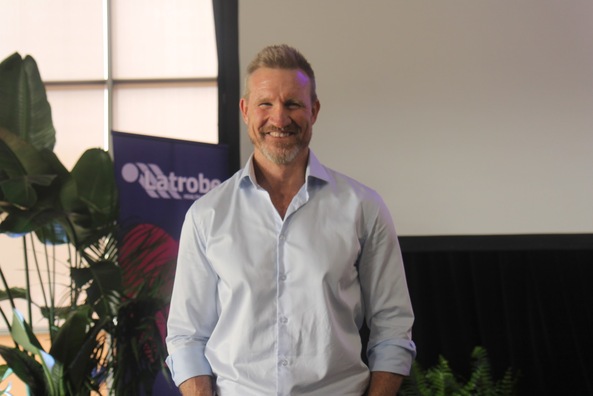By KATRINA BRANDON
LAYING down the numbers, Collingwood great Nathan Buckley spoke about health at this year’s Farm World event.
In a session led by Latrobe Health Services, Buckley and Latrobe Health Services Chief Executive, Ian Whitehead discussed the importance of keeping healthy with regular check-ups.
Whitehead opened the floor by talking about initiatives Latrobe Health Services are looking at, as well as those already completed, like upgrades to Maryvale Private Hospital.
Getting to the main topic of the day’s event, Whitehead discussed cardiovascular health within Australia, particularly Gippsland, and the partnership that Latrobe Health Services shares with the Shane Warne Legacy.
At Farm World, Latrobe Health Services conducted free health checks over the three days.
“Something like 1500 people a day are admitted to the hospital with cardiovascular disease-related losses,” Whitehead told those in attendance.
“Cardiovascular disease is still one of the leading causes of death. So 24 per cent of deaths in Australia are linked to cardiovascular disease, which can be shifted, changed, and prevented through intervention, education, diet, and simple things.”
Throwing over to the ‘main’ event, Whitehead welcomed Buckley on stage to talk about his passion for health and wellbeing.
“That’s pretty much what coaching is,” Buckley told the crowd.
“It came to me by helping young men make the most of their professional careers in a free sense, the thing that I enjoyed most about that used to be about winning, and used to be about being better than the opposition.
“I got more satisfaction from helping young folks take the next step in their career, about getting the best out of themselves.”
Buckley talked about how he went from playing football to being a coach, and wanting to take the stress off his team and installing confidence within themselves, taking a winning-or-losing mindset “off the table”.
When Buckley was 13 he recalled a junior coach pulling him in front of the group and saying, “this is what you shouldn’t do. Nathan’s not going hard enough. He’s not getting in and under tough enough”.
This was one example of coaching that Buckley said he wanted to change moving forward in his career.
“No one wanted to be more successful than me, and that was a product of being 26, 27-years-old. I felt stronger, faster, and fitter than the place that I was playing against, and I had everything I wanted. I wanted to be important. I wanted to be seen. I wanted to be young, and I wanted to play in front of as many people as possible. Because underneath that guy, inside that guy, was someone who wanted to prove himself worthy,” he said.
“Fundamentally, if I wasn’t doing footy, I didn’t think I was worthy as a person.”
The overwhelming pressure from football led to setbacks for Buckley. He told the crowd that it started to affect him mentally and emotionally.
Not knowing how to deal with that sort of pressure, he said that while he wasn’t depressed or tired, he would deal with the stress by heavily drinking in town “with the boys” and would run more than 50 kilometres home instead of catching a cab, just to do a bit extra training.
“These behaviours weren’t going to be sustainable. They weren’t going to help me get the best out of them,” he said.
“I came to realise that I was worth more than that. If social media were around when I was a kid, when I was a young footballer, I reckon it would have blown me up. I cared so much about what people thought, and we’re all on socials in some shape or form. Sometimes you’re the target, sometimes something you’re involved in, or an organisation, you’re involved as a target, but people say some nasty things when they’re not in your presence.
“But for me, I needed to earn my dad’s respect. That was why I became the footballer that I became, that’s why I went to Collingwood, because I wanted to play in front of as many people as I could, to be a big deal.”
Buckley followed the conversation by going from his experience with his dad to being a parent. He talked about being with his kids while not being there, constantly being engaged in his head, coaching his team, and having other needed conversations.
This realisation became another focus in his life; to be the person he needed to be at certain times.
Another realisation that Buckley talked about was the energy that you give off to people. Walking around and not realising the energy that you are putting off to people, following into your home, to ensure that you are aware of what messages you are sending out, are some things he shared with the crowd.
He asked: “How do you become a better version of yourself? So what do you know to be true of yourselves? How do you see the world? What are the things that piss you off? What are the things that fire you up, and why do they fire you up like that?”
“If I’m not aware of that anger, or if I’m not aware of that intensity and the impact that it has on people around me, not aware of what you’re doing in your house… If you’re not aware of its impact on your kids, you need to be, because you want to be the best parent you can and impact as positive an impact as you can on your kids.
“We all have an idea and a bit of a thing that you can shift and change in your life, that can just stop you a little bit, give you a little more energy. It might be as simple as going to this AFL check here, not just for you, but for your loved ones, so that you can get around for a little bit longer and give your love a little bit further, a little bit longer.”












